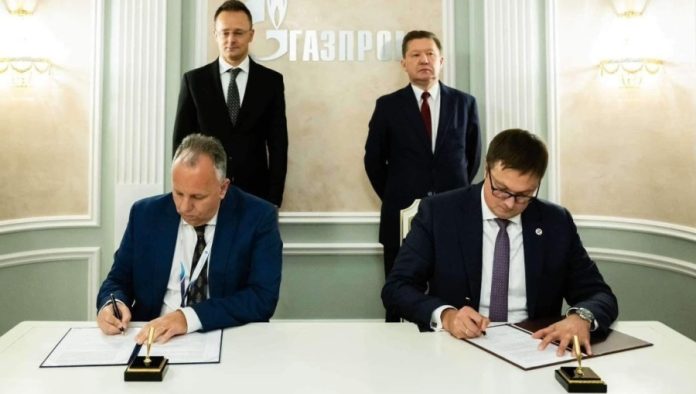Hungarian energy group MVM and Russian Gazprom signed a memorandum of understanding (MoU) guaranteeing continuous supplies of Russian gas at competitive prices, Hungarian Foreign Affairs and Trade Minister Péter Szijjártó informed.
The MoU on a possible increase in pipeline gas supplies to Hungary was signed during the International Gas Forum in St Petersburg.
Although the EU aimed to stop importing Russian gas by 2027, Hungary stated that it did not intend to give up gas supplies from that country because a reduction would threaten its energy security. Hungarian Prime Minister Viktor Orbán’s government is also at odds with Brussels over its opposition to sanctions against Russia and aid to Ukraine.
Hungary receives 4.5 billion cubic metres (bcm) of Russian gas under a contract with Gazprom signed in 2021 that does not expire until 2036. Russian supplies accounted for almost half of Hungary’s total gas imports last year.
The deal comes amid growing pressure from the European Parliament, where a debate on 9 October drew attention to Hungary’s growing dependence on Russian energy. However, sources say Hungary has consistently paid above-market prices for Russian gas since the 2021 agreement.
Hungary remains the only EU member state that has increased its energy co-operation with Moscow since the outbreak of the war in Ukraine. Szijjártó’s visit followed just a day after a debate in the European Parliament in which several MEPs, along with European Commission President Ursula von der Leyen, openly criticised Hungary.
The cessation of Russian gas supplies through Ukraine would not harm Hungary due to the Turkish Stream pipeline, Szijjártó stated. He added that the pipeline could be used by other European countries to compensate for supply disruptions via Ukraine.
This alternative route may help not only Hungary, but other countries of Central Europe if they face a serious situation in case there is no transit via Ukraine.
However, despite his claims, Rystad Energy warned in July that Hungary “would face large challenges in case of a complete halt of Russian gas flow through Ukraine.”
Assuming Moldova is supplied via the south, capacity via the Trans-Balkan pipeline from Romania would be fully allocated, halting inflows from Romania. Furthermore, Austria would be unable to forward gas to Hungary, while Croatia won’t have additional regasification capacity available before 2025.
